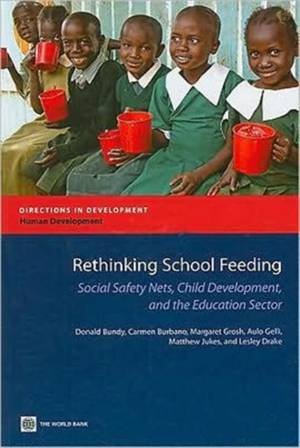
- Retrait gratuit dans votre magasin Club
- 7.000.000 titres dans notre catalogue
- Payer en toute sécurité
- Toujours un magasin près de chez vous
- Retrait gratuit dans votre magasin Club
- 7.000.000 titres dans notre catalogue
- Payer en toute sécurité
- Toujours un magasin près de chez vous
Rethinking School Feeding
Social Safety Nets, Child Development, and the Education Sector
Donald Bundy, Carmen Burbano, Margaret Grosh, Aulo Gelli, Matthew Jukes, Lesley Drake
33,45 €
+ 66 points
Description
The global food, fuel, and financial crises have given new prominence to school feeding as a potential safety net and as a social support measure that helps keep children in school. 'Rethinking School Feeding: Social Safety Nets, Child Development, and the Educator Sector' was written jointly by the World Bank Group and the World Food Programme (WFP), building on the comparative advantages of both organizations. It examines the evidence base for school feeding programs with the objective of better understanding how to develop and implement effective school feeding programs in two contexts: as a productive safety net that is part of the response to the social shocks of the global crises and as a fiscally sustainable investment in human capital, as part of long-term global efforts to achieve Education for All and to provide social protection to the poor. School feeding programs provide an explicit or implicit transfer to households and can increase school attendance, cognition, and educational achievement, particularly if supported by complementary actions such as deworming and food fortification. When combined with local purchases of food, school feeding can potentially be a force multiplier, benefiting both children and the local economy. Today, every country for which we have information is seeking to provide food, in some way and at some scale, to its schoolchildren. Coverage is most complete in high- and middle-income countries--indeed it seems that most countries that can afford to provide food for their school children do so. But where the need is greatest, in terms of hunger, poverty, and poor social indicators, the programs tend to be the smallest, though usually targeted to the most food insecure regions. These programs are also those most reliant on external support, and WFP supports nearly all of them. So the key issue today is not whether countries will implement school feeding programs, but how and with what objective. The near universality of school feeding provides important opportunities for WFP, the World Bank, and other development partners to assist governments in rolling-out productive safety nets as part of the response to the current global crises and to sow the seeds for school feeding programs to transition into fiscally sustainable investments in human capital in the future. 'Rethinking School Feeding' will be useful to government agencies and nonprofit organizations working in education reform and food and nutrition policies.
Spécifications
Parties prenantes
- Auteur(s) :
- Editeur:
Contenu
- Nombre de pages :
- 163
- Langue:
- Anglais
- Collection :
Caractéristiques
- EAN:
- 9780821379745
- Date de parution :
- 02-06-09
- Format:
- Livre broché
- Format numérique:
- Trade paperback (VS)
- Dimensions :
- 150 mm x 226 mm
- Poids :
- 294 g







